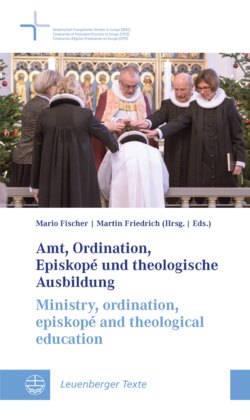Читать книгу Amt, Ordination, Episkopé und theologische Ausbildung / Ministry, ordination, episkopé and theological education - Группа авторов - Страница 22
На сайте Литреса книга снята с продажи.
2Statement 2.1The mission of the church
Оглавление32. All churches of CPCE have a common basic understanding of the mission of the church, formulated in the following way by The Church of Jesus Christ: “The church has been called to be an instrument of God for the actualisation of God’s universal will to salvation. It will be faithful to this call, if it remains in Christ, the infallible sole instrument of salvation. The certainty that this promise of God is reliable liberates and enables Christians and churches to witness to the world and for the world”.11 With the Meissen Declaration and the Reuilly Common Statement, churches within and beyond CPCE can assert: “The Church, the body of Christ, must always be seen in this perspective as instrumental to God’s ultimate purpose. The Church exists for the glory of God, and to serve, in obedience to the mission of Christ, the reconciliation of humankind and of all creation.”12
33. According to the concept of God’s mission to the world (missio Dei), the church follows God’s relationship with the world as creator, God’s saving work through the Son and God’s transforming power of the Spirit – with a view to the building up of God’s Kingdom. All Christians take part in the mission of God.
34. In defining the realisation of church fellowship, the Leuenberg Agreement sees witness and service as essential to the mission of the church. Both witness and service point the church to the whole of humankind and have an individual as well as a social dimension, “a common responsibility. In that this is a service of love, it [i.e. the common service] focuses on human distress and seeks to remove the causes of that distress. The struggle for justice and peace in the world increasingly demands that the churches accept a common responsibility” (LA 36). “It is in keeping with the Holy Spirit’s nature for it [i.e. the church of Jesus Christ] to communicate in convincing fashion God’s love for people in their social contexts and in their concrete life-situations.”13
35. Consequently, the practices of ministry, ordination and episkopé in our churches must be organised in order to empower the churches for their common witness and service to the whole of humankind. This calls for a ministry of the church that faces up to the challenges of contemporary society, such as gender justice, the rights of minorities and the integrity of creation as well as the marginalisation of faith and church.
36. As it is the matter of a common witness and service, the member churches of CPCE must do what is in their power to deepen the community which already exists between them, but also constantly seek links and connections with other churches that are not in full fellowship with CPCE.
37. It is a basic insight of the Reformation that God’s mission is fulfilled through God’s living word. The church is characterised as a creature of the word (creatura verbi). This implies that structures in the church should ensure that decisions are made sine vi, sed verbo, not with external force, but through the power of the word.
